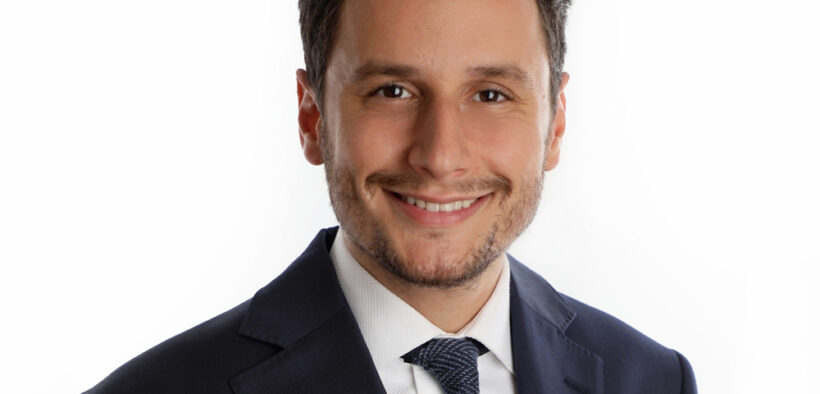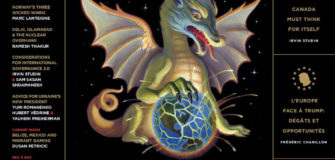World Order in Flux: Toward a New Canadian Geo-Strategy

Greetings! Zachary Paikin here – Senior Editor at GB.
To mark GB’s tenth anniversary, our magazine is proud to be launching this section of Geo-Blogs featured here on our new website. These Geo-Blogs bring together analysts from different continents writing in several languages to discuss key challenges in international affairs. As the global chessboard evolves and international relations become increasingly complex, our aim at GB is to speak directly to audiences across the world in a neutral but thought-provoking fashion on the issues that matter to their respective regions.
These global changes will affect Canada profoundly, in ways that are not often considered. In this introductory note, allow me to outline briefly the core interests and logic that will inform my Geo-Blogs in this space over the coming weeks and months. In short: Changes in international order and the revival of great power rivalry will force Canada to re-imagine the fundamentals of its foreign policy strategy and re-conceptualize how it thinks of its very geography. This will take years – decades in fact – and will require multi-partisan commitment and collaboration from the political class and a broad national imagination that is unafraid to challenge sacred cows.
The rise of China, the consolidation of the European Union’s hegemonic position on the Old Continent and its gradual emergence as a leading actor on the world stage, and the persistence of Russia’s disruptive capabilities require Canada to manage new pressures emerging from multiple geographic sources located, effectively, right on its doorstep.
Editor-in-Chief Irvin Studin has written at length in the pages of GB about a more “strategically promiscuous” Canadian foreign policy that militates against the country’s current over-dependence on the United States, in favour of a four-point strategy under the moniker “ACRE” that balances relations between key international players – America (to Canada’s south), China (to its west), Russia (across the Arctic to its north) and Europe (to its east). The rise of China, the consolidation of the European Union’s hegemonic position on the Old Continent and its gradual emergence as a leading actor on the world stage, and the persistence of Russia’s disruptive capabilities require Canada to manage new pressures emerging from multiple geographic sources located, effectively, right on its doorstep. Canada’s long-term prosperity, security and relevance in international affairs will depend on whether it succeeds or fails in this endeavour.
One of the key interests of the Institute for 21st Century Questions – the think tank under which GB is housed – is to explore possibilities for establishing “interstitial tendons” to stabilize relations between key emerging geopolitical blocs. For example, unrestrained and unregulated competition between the European Union and the fledgling, Russian-backed Eurasian Economic Union was a leading driver of the Ukraine crisis. In fact, the creation of such tendons would not only serve a global purpose by reducing friction in potential international flashpoints, but also secure Canadian interests by helping to ensure that conflict does not erupt on or near any one of Canada’s four “borders”, as it were.
With the nature of Ottawa’s relationship with Washington becoming increasingly uncertain, the challenge outlined here will have to be addressed through a made-in-Canada strategy. Canada can no longer safely assume that the interests of Western countries will always align, nor can it hitch its wagon to America’s grand strategy when that strategy is very much in flux. A national foreign policy rooted largely – if not nearly exclusively – in a values-based discourse will leave Canada vulnerable to the effects of emerging global rivalries and force it to operate on terms set by other, more strategically savvy states.
My Geo-Blog here at GB will focus on the implications flowing from two key international developments which I believe should represent the starting point for the development of an independent Canadian grand strategy in an increasingly post-Western world.
First, following the unambiguous return of great power rivalry on the world stage, the post-Cold War project of rendering the Western-led liberal international order synonymous with world order itself has definitively failed. While rooted in universalist, values-based rhetoric, the liberal order ultimately depends on a power base of liberal Western states. It is doubtful that it will ever be possible to incorporate countries as complex and powerful as Russia and China into an international order rooted in liberal principles and American leadership.
Despite containing elements of engagement, one of the aims of the United States’ global strategy throughout the post-Cold War era has been to hedge against the rise of illiberal (or potentially illiberal) great powers such as Russia and China. This hedging – which at times has veered toward containment – was effectively aimed at policing the frontiers of the liberal international order, thus keeping potential rivals “far away” from North America’s shores, as it were. Such a strategy only served to antagonize these rising or returning great powers.
As such, the decoupling of Washington’s security strategy from the pursuit of a universal liberal order under the Trump administration leaves Canada isolated in an increasingly rivalrous world. Far from the clear-cut, democratic-authoritarian binary to which advocates of liberalism are more accustomed, the emerging global picture features complex and overlapping relations between various players keen on testing what the new rules of the game are.
It is not by accident that the past several years have witnessed Canada’s relations with the United States, Russia, India, China, Iran and Saudi Arabia all deteriorate or encounter significant roadblocks.
It is not by accident that the past several years have witnessed Canada’s relations with the United States, Russia, India, China, Iran and Saudi Arabia all deteriorate or encounter significant roadblocks. The previous paradigm for organizing global affairs – that of an ever-expanding, American-led liberal order – has gradually collapsed since the onset of the Ukraine crisis. Canada has largely failed to adapt to a more unpredictable international environment in which states that are keen to be term-setters are more ruthless in the pursuit of their interests. Ottawa must begin cultivating partnerships of its own with a diverse set of players across the globe, developing a delicate equilibrium between them. Unlike the oft-cited appeal to work with “like-minded countries” that share our values, this will involve constructing varying coalitions on different issues to achieve key Canadian strategic aims where interests overlap (for example, see my Query piece on Canada-Russia relations in the Fall-Winter 2019 issue of GB).
Second, one of the by-products of the revival of great power rivalry and the rise of non-Western states has been the return of Eurasia to the centre of global affairs. The American-led liberal order is rooted largely in the dominance of sea power, while the deepening Sino-Russian strategic partnership of the past several years is designed – among other things – to shift global power back to the heart of the Eurasian landmass.
When tied to a monolithic liberal order – as was the case throughout the bulk of the post-Cold War period – Canada’s place in this binary was clear. Ottawa largely outsourced its foreign policy strategy to Washington, occasionally parting with its southern neighbour symbolically on a few high-profile issues (e.g., the Iraq war or continental ballistic missile defence) to assert its difference and separateness from the United States, in part for psychological or identity-related purposes. These few instances of disagreement illustrate how Canadian foreign policy has often effectively been reduced to efforts to legitimate Canada’s domestic political order, turning the country into a strategic cripple vis-à-vis the wider world. Now, faced with an increasingly self-interested United States bent on confronting rival powers and taming its allies, Canada will need to evaluate independently how it wishes to engage with an increasingly integrated Eurasian supercontinent.
In the late 1980s and early 1990s, the advent of free trade in North America combined with the launch of Washington’s post-Cold War project of global term-setting to render Canada increasingly dependent on the United States, both in material and in ideological terms. The result is a Canada that is largely unprepared for a world that now features a rapidly evolving balance of power and the potential for significant instability on all four of Canada’s “borders” as rival interests, identities and integration projects clash. Subsequent Geo-Blogs will aim to outline some of the logic and contours of a more robust, independent Canadian global strategy for the 21st century.
The views expressed here are the author’s alone and do not necessarily reflect those of Global Brief.









